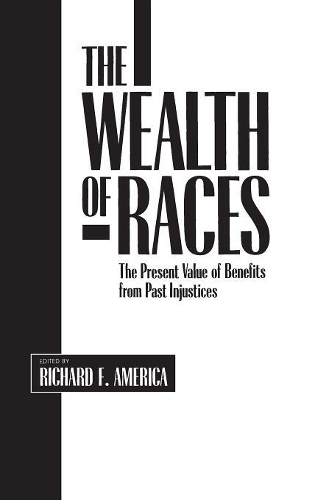
The Wealth of Races: The Present Value of Benefits from Past Injustices
(Hardback)
Available Formats
Publishing Details
The Wealth of Races: The Present Value of Benefits from Past Injustices
By (Author) Richard F. America
Bloomsbury Publishing PLC
Praeger Publishers Inc
24th August 1990
United States
Classifications
Tertiary Education
Non Fiction
Ethnic studies / Ethnicity
Racism and racial discrimination / Anti-racism
305.800973
Physical Properties
Hardback
240
Width 156mm, Height 235mm
595g
Description
This collection of essays examines the question of how injustices of the past affect entire groups of people today and outlines the current beneficiaries of these injustices. Although discriminatory practices can be based on ethnicity, religion, and gender, this book focuses on one important type--racial discrimination--and deals with the way it affects both blacks and whites. The authors address the question from different perspectives and, although there is no real consensus as to what extent unjust enrichments currently exist because of past discrimination, the focus of several essays is on the need to systematically and equitably redistribute wealth. In beginning to explore these questions, the volume addresses the larger issues of how the costs and benefits of past practices can be measured and how historical injustices should affect current public policy matters. The volume is organized in a straightforward manner intended to create an integrated discussion. An introductory essay charts the development of the project and offers a summary and critique of each essay. The first section explores the issue of slavery and current policy and considers the caution required when developing policy based on disputed models and assumptions. The second section examines the economic impact of slavery and discrimination on the functioning of the labor market. In the final section, some of the implications of redistribution policies are considered in relation to the various cost and benefit analyses. A final essay and conclusion sum up the study and outline the broad policy setting in which this work can take place. The book will be an important resource for courses in history, sociology, and public policy and an important addition to public and university libraries.
Reviews
These essays cover a lot of ground and are essential reading for an understanding of the major factors behind contemporary political conflict in South Asia.-Journal of Third World Studies
This important compendium of ideas, data, and estimates of the economic effects of discrimination against blacks and of possible reparations to them is well written and edited by highly qualified experts with vast experience in their respective research fields. The main work is set in neoclassical terms. However, the neoclassical approach is subjected to well-deserved criticism because of its unrealistic assumptions and limited coverage of the costs of discrimination. Several important findings may be noted: the gap between wages and incomes of blacks and whites is as wide in the 1980s as it was at the beginning of the century; whichever method is applied to estimate losses suffered by the blacks, the present value of these losses would run into trillions of dollars; and, though the dispensation of any such reparations would raise issues of why, how, to whom, and with what impact, there is now more willingness to talk about reparations than ever before. Although philosophical and moral issues are touched on, the economic costs and benefits of slavery occupy the primary position in the discussion. And although readers may question the methods used to compute reparations, the volume is highly recommended and should be indispensable to anyone working on the topic of discrimination and reparations.-Choice
"These essays cover a lot of ground and are essential reading for an understanding of the major factors behind contemporary political conflict in South Asia."-Journal of Third World Studies
"This important compendium of ideas, data, and estimates of the economic effects of discrimination against blacks and of possible reparations to them is well written and edited by highly qualified experts with vast experience in their respective research fields. The main work is set in neoclassical terms. However, the neoclassical approach is subjected to well-deserved criticism because of its unrealistic assumptions and limited coverage of the costs of discrimination. Several important findings may be noted: the gap between wages and incomes of blacks and whites is as wide in the 1980s as it was at the beginning of the century; whichever method is applied to estimate losses suffered by the blacks, the present value of these losses would run into trillions of dollars; and, though the dispensation of any such reparations would raise issues of why, how, to whom, and with what impact, there is now more willingness to talk about reparations than ever before. Although philosophical and moral issues are touched on, the economic costs and benefits of slavery occupy the primary position in the discussion. And although readers may question the methods used to compute reparations, the volume is highly recommended and should be indispensable to anyone working on the topic of discrimination and reparations."-Choice
Author Bio
RICHARD F. AMERICA is a policy analyst in Washington, D.C. He is coauthor of Moving Ahead: Black Managers in American Businessand author of Developing the Afro-American Economy.
